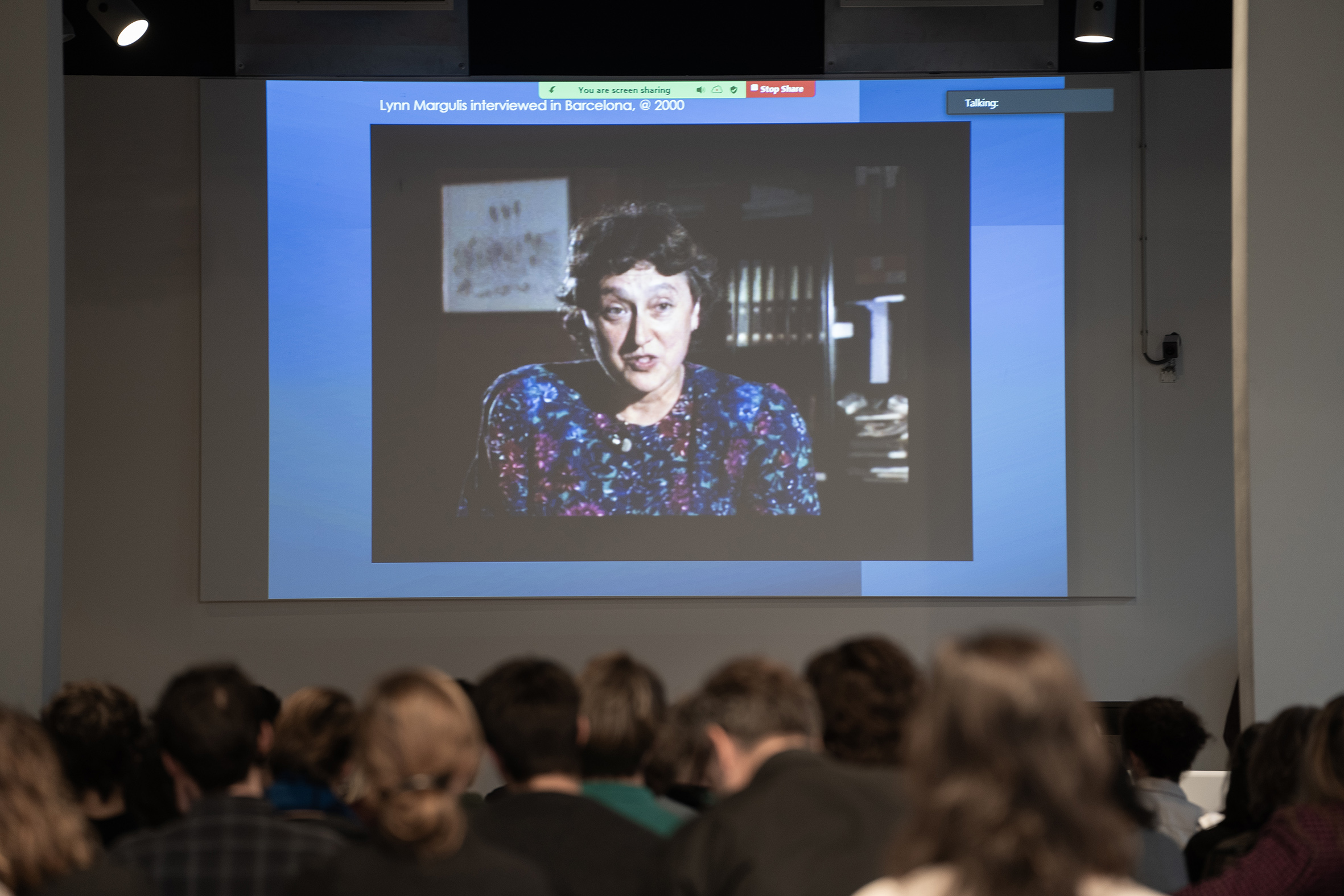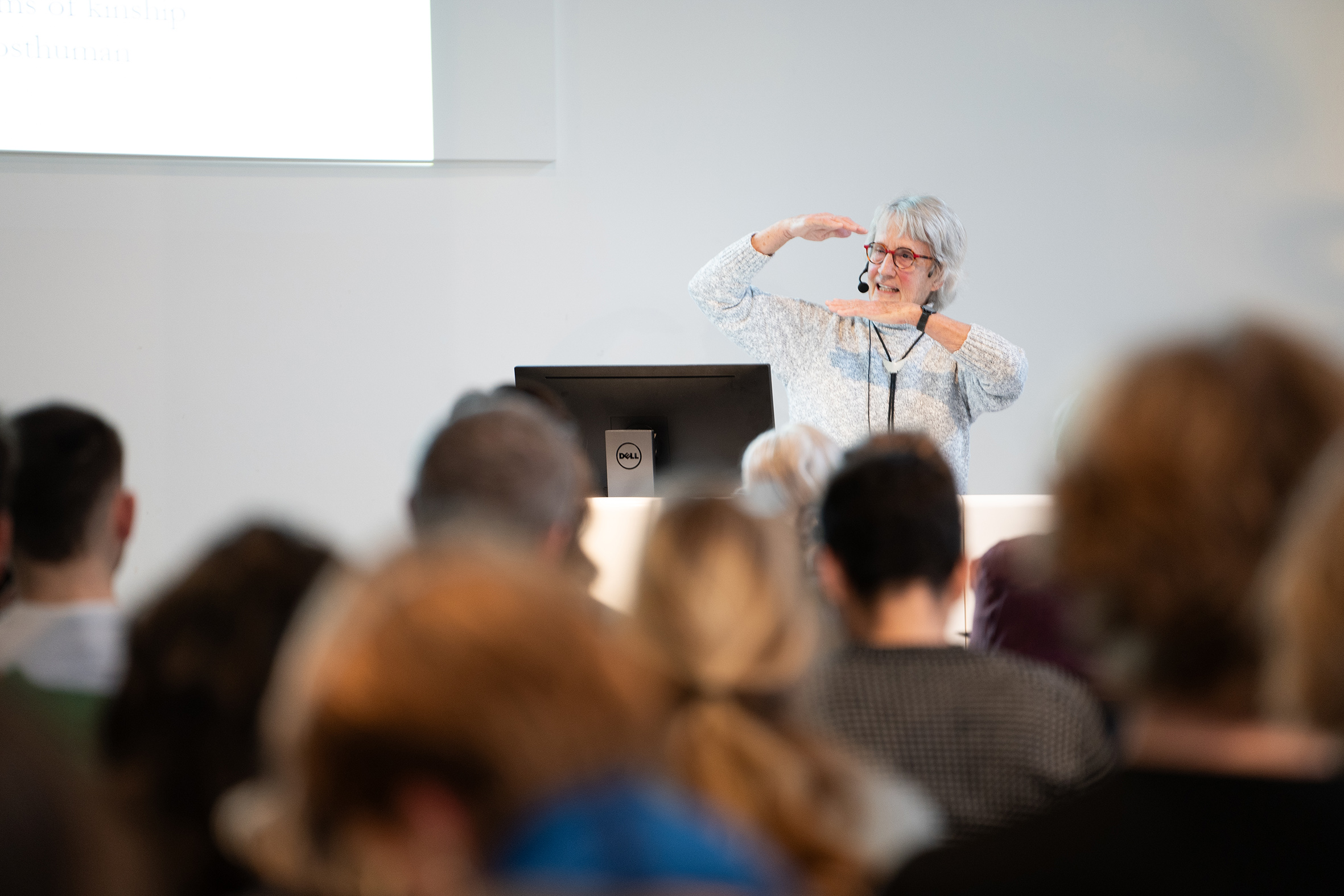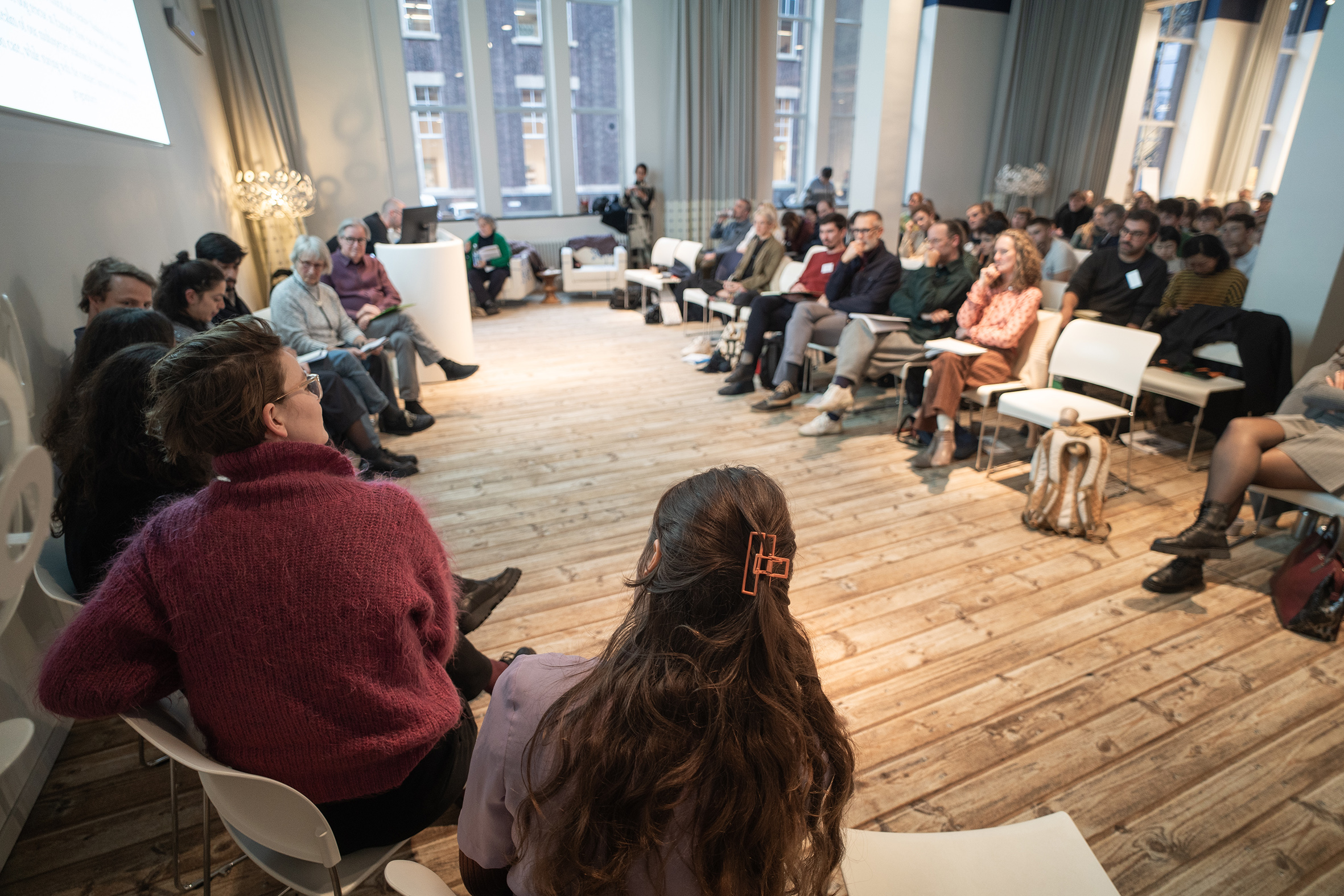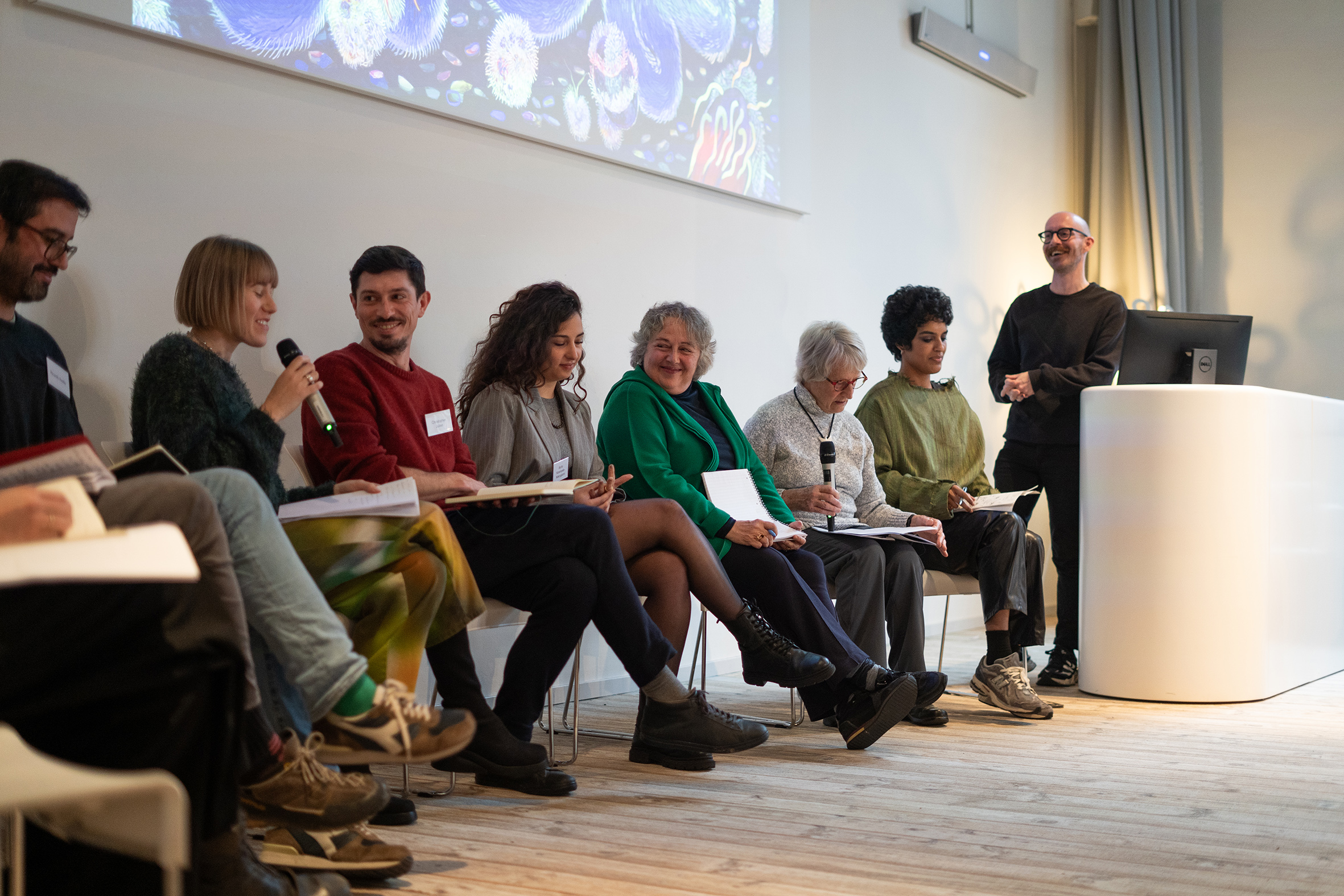Posthuman Symbiosis Masterclass: [Un]learning with Donna Haraway and Rosi Braidotti

Posthuman Symbiosis Masterclass, Day Two, TU Delft Faculty of Architecture [Image credit: Alex Kirschstein]
Powerful norms and troubled histories are embedded in the very namesake of the "masterclass". Yet, the experiences shared during “The Posthuman Symbioses Masterclass" could not be further from this description. The gathering on December 8, 2023 hosted by TU Delft Faculty of Architecture and the Built Environment was a collective unlearning moment: an event remembering the often-neglected contributions to Gaia Theory by the biologist Lynn Margulis. The symposium, curated by Robert Gorny and Andrej Radman from the Architecture Philosophy and Theory (APT) academic group / Ecologies of Architecture (EoA) research group, took the form of a transgenerational feminist exchange between Donna Haraway, Rosi Braidotti, Bruce Clarke and thirteen emerging scholars. The event was opened by Setareh Noorani from Het Nieuwe Instituut in Rotterdam, followed by Clark’s introduction of Margulis’ work through holobioms (bacterial matts). These plenary comments provided an entry point to engage a central notion running through this event, namely, Haraway's speculations on ‘making kin’ with Margulis's perspectives on living through sympoiesis, and further invited Braidotti's critical posthumanism as a cartography of power relations embedded in practices of knowledge production. These engagements set the stage for further presentations, discussions, and encounters attending to the sympoietic process of learning together, defined by different approaches, genealogies, backgrounds, histories, and continued into this tentacularly produced text, a collective effort of diffractive readings.

Donna Haraway [Image credit: Alex Kirschstein]
The sessions elaborated on the transition from the spatial disciplines — informed not least by Critical Posthumanism, Feminist STS, Critical Geographies, Urban Studies, and Environmental Humanities — to a transdisciplinary perspective, which recognizes the environment as a dynamic and integrated collection of ecosystems. Spanning time and space, from anarchist genealogies of planning to the Venezuelan Amazon and the ephemeral Mediterranean islands, this symposium set out to disrupt the long-standing, rigid arrangements of knowledge production. It became a collaborative practice; a messy entanglement of experts, hosts, fellow presenters and the bodies we brought with us – salmons, seamounts, mosquitoes, dogs, cows, grass, water, forests, lagoons and soils concentrated together by our need to engage with a process of unlearning.
Presentations and panel discussions troubled the subject(s) of knowledge production, urging us to rethink our epistemologies in learning-with. Our focus was directed towards the neglected, the concealed or the sacrificed worlds, things, stories, relations, processes, which gestate — in their inherent immanence and resistance — the possibility to act as counter-teachers. Discovering these minor stories and following them even along unknown or damaged paths entailed an intentionally subjective and affirmative becoming-with that transgresses the conventional division between the subjects and the objects of knowledge, transforming the whole process of scientific research. This involved ecological re-readings of environments, namely the Upper Rhine, the Venice lagoon and the Parisian landscapes as discussed in the presentations by Just, Chouairi and Anderson Fiero, but also reconceptualizations of cyclical appearances as elaborated by Karampela-Makrygianni through the dissolving of Mediterranean islands. Rescued dogs become subjects of transnational mobilities in Stavridi’s work, while transhuman genealogies and techno-biological symbiosis of Cowborgs came into focus through Heinrich’s and Muñoz Sanz’s contributions. Similarly, Avella engaged indigenous perspectives in the Amazon to offer re-readings of the ‘modernisation’ projects that combat malaria, and further expanded the techno-cultural coupling. The concept of response-able design came into focus through the conversation between Koekoek and Paias, while Kuzmanić argued for re-framing urban planning as a complex social ecology by recontsructing the discipline's anarchist roots. With respect to noesis, thinking was conceptualized as the environment in Julien’s work, and van der Merwe’s discussion showed how the affective processes of physiological and neurobiological operate as interspecies social ecologies.
Symposium participants acknowledged this epistemological transformation by attending to the complex interconnections between knowledge and power, as reflected not only in the prevailing learning patterns, but also in the teaching subjects. Our teachers are so manifold that we have often not even recognized them as such; they range from ancestral role models (see Avella, van der Merwe, Heinrich) and interdisciplinary scientists (see Stavridi, Julien, Karampela-Makrygianni) to invisibilized non-humans (see Just, Chouairi, Anderson Fiero). Some have continuously influenced our thoughts through long-lasting exchanges across Posthumanist, Feminist and Environmental Humanities perspectives, while others, such as ephemeral Mediterranean islands (see Karampela-Makrygianni), are still being discovered metamorphosing our knowledge practices. This approach to learning, practiced through becoming-with, is mediated by the implied but usually forgotten (if not condemned) notion of care; and its material-discursive implications. Thinking with care remains central in transgenerational feminist learning (and living), guiding the transition from the matters of concern to the matters of care. Its embodiment directs a performative type of knowledge, where one re-learns to learn attentively, with genuine curiosity and critical situatedness.

Panel Discussions, Day Two, TU Delft Faculty of Architecture [Image credit: Alex Kirschstein]
The performative dimension of practices of care in the context of the masterclass, extended further than what presenters anticipated, recognizing the open-ended — and usually uncomfortable — question of the borderscape as a critical condition for sympoiesis, while also bringing forward the limits of care. Domesticated dogs (see Stavridi), erased indigenous worlding practices (see Avella), forgotten volcanic formations at the bottom of the Mediterranean basin (see Karampela-Makrygianni), self-built communities (see Kuzmanić), lawns and meadows (see Anderson Fiero) or river biomes (see Just) become unfamiliar critters that allow us to question human exceptionality, norms, and notions of native-ness/invasive-ness. Paying attention to these liminal sites and actors, which is a fine thread connecting the presentations of this masterclass, urges us to ‘stay with the trouble’ of the imminent vulnerability within living and dying entanglements that define co-habitation. To learn with the environments and beings that inhabit our projects, we need to enter into a reciprocal relationship with the world, producing an indebtedness, welcoming the messiness of the borderscape and hoping for a radical regrounding.
Unlearning and relearning is a messy process which profoundly questions our current practices of sharing and making, and requires us to enter marginal and uncertain spaces of becoming-with, retaining our humility about the outcomes of the process. Often, these interactions — no matter the good intentions they are founded on — result in naive, uncomfortable friendliness failing to recognize the implications of our own ethical and locational limits, especially in our engagement with the past as living material archive. In this interaction, facing our ancestors and transgressing conventional anthropocentric perspectives entails a conscious stance in opposition to prevailing histories and in relation to forgotten or exterminated (Indigenous) worlding practices that direct us towards kinship and accountable engagement, as elaborated in the works of scholars such as Danowski, Escobar, Lewis-Williams and Loubser; and Viveiros de Castro.
Trying to define the ethical and material implications of the notion of response-ability, we find ourselves limited by our territorialized languages, values and positions. Our learning process starts from the deterritorialization and reterritorialization of our wording; from questioning the words we use or what they imply and understanding what we can and cannot say in our narrations of the planetary, the Indigenous, the non-human, the grassroot genealogies of scientific knowledge. The new collective vocabulary of notions and concepts becomes a link between the past and the future, the virtual and the actual, the natural and the cultural; cultivating an essential space of in-between where a radical multiplicity of locally situated knowledge, finite freedoms, fragmented autonomies, and self-made ecologies develop, participating further in the constitution of the material world — understood as living material archive, as externalized knowledge.
Care, embodiment, performance, response-ability, kinship — these notions, and many more, constitute this collectively constructed vocabulary and describe our shared transgenerational encounter fueled by our urge to think-with each other in more-than-human ways. Although we (as subjects) remain tied to our locational limits and our embodied perspectives, we are also constituted by the affective process of moving through space, of materially interacting with the world simultaneously shaping it and being shaped by it in relational temporalities. Throughout this process — which defines the coexistence of different worlds as seen by different life forms sharing the same milieu but developing differentiations through affections — encounters do not only emphasize difference but produce new subjects. Participants and attendees — as subjects — shared in the context of this masterclass an intense encounter that affected us collectively and individually in ways that cannot be limited to the particular time and space of the symposium.
While this event could be described reductively as a mere set of presentations, in the end it became a shared effort to (un)learn how we make and do knowledge. We glimpsed unexpected worlds of knowledge sharing, grounded in care, collectiveness, and response-ability, engaging in a process that troubles the hierarchy of learning. This is the gift we received. And it is a gift that we, as subjects-in-the-making, wish to reclaim in the multiple environments in which we exist. They are stories coming from our intense embodied co-presence; our sweaty, blotchy, nervous, awkward, trembling performances and intra-actions. This affective impact manifests at every scale — from the systematic engagement with extended forms of planetary subjectivities to the peer support among the presenters of the masterclass against public-speaking anxiety — evoking accountable engagement. The concept of accountable engagement remains interconnected to the notions of belonging or of kinship which develop through our collective becoming-with performed in the Posthuman Symbiosis masterclass. They uncover a space of virtuality that allows the temporal embodiment of a collective "we" and the possibility for some form of endurance besides our locational and conceptual limits.

Panel Discussions, Day Two, TU Delft Faculty of Architecture [Image credit: Alex Kirschstein]
If our teachers remain uninvited to the main stage of history and to the “official” conversation, how might we learn to become-with them, as forever indebted to them for learning to see the world with a new set of eyes (and perhaps, touch and smell)? We want to foreground embodied and situated difference as a diffractive, caring re-reading; and to emphasize the necessity to unlearn to do so. The proceedings of the Posthuman Symbioses Masterclass did not suggest that we have the right to tell the story of our teachers on their behalf; rather, it gestured toward our position as those that might facilitate the ongoing process of unlearning. That is how we pay our debt to our teachers: Staying response-able to these thresholds so that we might evoke partial, uncertain and de-territorializing ways of living with problems, starting from this consciously open-ended and spontaneously chaotic reflection.
The sympoietic process of 'making with,' understood through critical posthumanist and feminist critiques, asks us to fundamentally rethink the concept of a 'masterclass'. It requires that we trace the cartography of power relations embedded in hierarchical practices of knowledge production. These transgressions are embodied and performative: an active process of recognition to those we are indebted to and foregrounds worlding practices as situated, location-specific, material and relational. The gifts we receive draw us into a spatial relationality through solidarity and kin-making, locating us within a differential genealogy that requires diffractive re-readings and un-learning.
Symposium Program
Day One:
https://nieuweinstituut.nl/en/events/evening-with-donna-haraway
Day Two:
SESSION ONE: POSTHUMANISM
14:00 Setareh Noorani: Introduction
31:05 Myrto Karampela-Makrygianni: “The Sea as Island: Borderscaping the Mediterranean Basin”
38:43 Johanna Just: “An Earthly Writing of Space – Exploring more-than-human Relations in the Upper Rhine Plain”
49:35 Molly Anderson Fiero: “Othering time: tuning in to more-than-human animals in the theory and practice of landscape architecture”
58:32 Jere Kuzmanić: “Urbanism as social ecology: Reconstructing the continuous influence of anarchist ideas on the history and present of urban planning”
01:06:48 Chris F. Julien: “Thinking as environment”
01:18:38 Ricardo Avella: “Modernizing the Venezuelan Amazon – Rural housing as an instrument of Cold War era colonization”
01:26:25 Rosi Braidotti: Response
SESSION TWO: SYMPOIESIS
00:00 Bruce Clarke: “Gaian Technics: Sympoiesis = Symbiosis + Autopoiesis = Natural Technicity”
29:31 Victor Muñoz Sanz: “Cowborgs in the polder: how the design of farm buildings, animal bodies and technologies transformed Dutch dairy landscapes”
38:04 Alina Paias & Catherine Koekoek: “Sympoietic conditions for change”
46:59 Amina Chouairi: “Venice in a lagoon: shifting perspectives in an ‘insoluble labyrinth’”
55:47 Gert van der Merwe: “Water: Flow, Code and Stock – A rhizomatic genealogy of the Political Ecology in Namibia”
01:04:31 Maria-Dolores Heinrich: “Becoming-with: Genealogising Collective Futures.”
01:13:01 Katerina Stavridi: “The Subject of Rescue: Producing the Nation through Transnational Dog Rescue Mobilities”
01:24:50 Donna Haraway: Response
01:46:00 Discussion
Ricardo Avella is a Venezuelan architect and urbanist based in Brussels, and a doctoral candidate at Delft University of Technology researching the history of the colonization of the Venezuelan Amazon during the Cold War.
Maria Heinrich is an architectural designer and researcher working for parties such as the Nieuwe Instituut in Rotterdam or MonU magazine. She received her B.A. from the TU Munich and her M.Sc. from the TU Delft in Summer 2023.
Johanna Just is an architect and doctoral fellow at the Institute for Landscape and Urban Studies at ETH Zürich. She is a guest editor of gta papers, co-founder of the journal DELUS and co-organised the PhD summer school Tentacular Writing. Johanna has worked in architecture and art practices in the UK and Germany and taught at the Bartlett and Oxford School of Architecture on architecture and landscape architecture programs. She studied Architecture at the University of Hanover and IUAV Venice and holds a MArch Architecture degree (distinction, Bartlett Medal) from the Bartlett.
Myrto Karampela-Makrygianni has graduated cum laude from the MSc at the Faculty of Architecture and the Built Environment, TU-Delft. Her areas of expertise are guided primarily by her research on more-than-city — especially ocean — urbanization, and on critical cartographies as a medium of new materialism worlding practices. Her current research focuses on alternative forms of co-existence between human and morethan-human assemblages through sympoiesis and practices of knowing-in-becoming.
Jere Kuzmanić is a Ph.D. candidate at Departament d'Urbanisme, Territori i Paisatge (DUTP), ETSAV—UPC Barcelona, with FPU Spanish state scholarship support. His research focuses on the history of planning cultures from proto-ecological and ‘from-below’ perspectives and urbanism as social ecology. He has published non-academic pieces in eFlux, Critica Urbana, and Le Monde Diplomatique, among others.
Katerina Stavridi is currently a PhD candidate at the School of Architecture at the National Technical University of Athens. She has a background in Urban Studies (UvA) and Architecture (NTUA). Her research interests include more-thanhuman urban geographies, sensory urbanism and feminist methodologies that aim to destabilize ways of knowing bodies and space.
Gert van der Merwe grew up in Namibia before moving to South Africa where he graduated from the University of Pretoria (MProf. Arch.) in 2014 and worked until 2020, before returning to teach at the Namibia University of Science and Technology. He is currently pursuing a PhD at TU Delft.
Published: 03/11/2024
